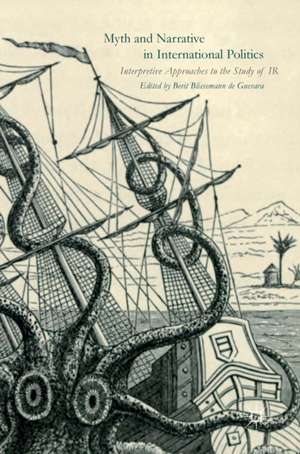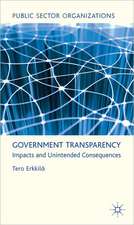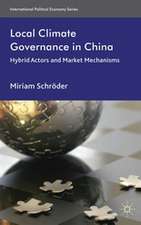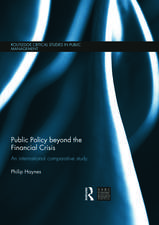Myth and Narrative in International Politics: Interpretive Approaches to the Study of IR
Editat de Berit Bliesemann de Guevaraen Limba Engleză Hardback – 23 iun 2016
Myth and Narrative inInternational Politics: Interpretive Approaches to the Study of IRoffers conceptual and methodological guidance on how to make sense of differentmyth theories and how to employ them in order to explore the powerfulcollective imaginations and ambiguities that underpin international politicstoday. Further, it assembles case studies of specific myths in different fieldsof International Relations, including warfare, global governance,interventionism, development aid, and statebuilding. The findings challengeconventional assumptions in International Relations, encouraging academics in IR and across a range of different fieldsand disciplines, including development studies, global governance studies,strategic and military studies, intervention and statebuilding studies, andpeace and conflict studies, to rethink ideas that are widely unquestioned bypolicy and academic communities.
Preț: 1172.64 lei
Preț vechi: 1430.05 lei
-18% Nou
Puncte Express: 1759
Preț estimativ în valută:
224.41€ • 232.96$ • 187.12£
224.41€ • 232.96$ • 187.12£
Carte tipărită la comandă
Livrare economică 22 martie-05 aprilie
Preluare comenzi: 021 569.72.76
Specificații
ISBN-13: 9781137537515
ISBN-10: 1137537515
Pagini: 317
Ilustrații: XXIII, 313 p. 6 illus., 1 illus. in color.
Dimensiuni: 148 x 210 x 25 mm
Greutate: 5.41 kg
Ediția:1st ed. 2016
Editura: Palgrave Macmillan UK
Colecția Palgrave Macmillan
Locul publicării:London, United Kingdom
ISBN-10: 1137537515
Pagini: 317
Ilustrații: XXIII, 313 p. 6 illus., 1 illus. in color.
Dimensiuni: 148 x 210 x 25 mm
Greutate: 5.41 kg
Ediția:1st ed. 2016
Editura: Palgrave Macmillan UK
Colecția Palgrave Macmillan
Locul publicării:London, United Kingdom
Cuprins
Notes on Contributors.- Foreword: Myths <> Silences; DvoraYanow.- Introduction: Myth andNarrative in International Politics; BeritBliesemann de Guevara.- PART I – THEORETICAL ANDMETHODOLOGICAL FOUNDATIONS.- 1. Myth in International Politics: Ideological Delusion and Necessary Fiction; BeritBliesemann de Guevara.- 2. Beyond NationalPolicy-Making: Conceptions of Myth in Interpretive Policy Analysis and TheirValue for IR; SybilleMünch.- 3. The Precipice ofMyth: Mythology/Epistemology; RobertCooke.- 4. Bringing ClaudeLévi-Strauss and Pierre Bourdieu Together for a Post-structuralist Methodologyto Analyse Myths; CatherineGoetze.- 5. How to Study Myths:Methodological Demands and Discoveries; Franziska Müller.- PART II – EMPIRICALEXPLORATIONS.- 6. Warlords and States:A Contemporary Myth of the International System; CatherineGoetze.- 7. Afghanistan and the‘Graveyard of Empires’: Blumenberg, Under-complex Analogy and Basic Myths in InternationalPolitics; FlorianP. Kühn.- 8. Mutually ImplicatedMyths: The Democratic Control of the Armed Forces and Militarism; KatharineMillar.- 9. Tales and Images ofthe Battlefield in Contemporary Warfare; AlastairFinlan.- 10. The Powerful Myth of International Community and the Imperative to Build States; Katarzyna Kaczmarska.- 11. Global Governanceand the Myth of Civil Society Participation; Charlotte Dany and Katja Freistein.- 12. Myths of the Near Future: Paris, Busan and Tales of Aid Effectiveness; Franziska Müller and Elena Sondermann.- 13. Organising Babylon: the Coordination of Intervention and the Denial of Politics; Stephan Hensell.- PART III – REFLECTIONS.- 14. Mythography: NoExit, No Conclusion?; MichaelLoriaux and CeceliaLynch
Notă biografică
Dr Berit Bliesemann de Guevara is a Senior Lecturer inPeacebuilding at Aberystwyth University, UK. Her current research focuses onways of knowing in conflict and intervention politics through projects ontransnational think tanks, urban legends of intervention, theatricalperformances during politicians’ field visits and, not least, myths ininternational politics.
Textul de pe ultima copertă
This book systematically exploreshow different theoretical concepts of myth can be utilised to interpretivelyexplore contemporary international politics. From the international communityto warlords, from participation to effectiveness – international politics isreplete with powerful narratives and commonly held beliefs that qualify asmyths. Rebutting the understanding of myth-as-lie, this collection of essaysunearths the ideological, naturalising, and depoliticising effect of myths.
Myth and Narrative inInternational Politics: Interpretive Approaches to the Study of IRoffers conceptual and methodological guidance on how to make sense of differentmyth theories and how to employ them in order to explore the powerfulcollective imaginations and ambiguities that underpin international politicstoday. Further, it assembles case studies of specific myths in different fieldsof International Relations, including warfare, global governance,interventionism, development aid, and statebuilding. The findings challengeconventional assumptions in International Relations, encouraging academics in IR and across a range of different fieldsand disciplines, including development studies, global governance studies,strategic and military studies, intervention and statebuilding studies, andpeace and conflict studies, to rethink ideas that are widely unquestioned bypolicy and academic communities.
Myth and Narrative inInternational Politics: Interpretive Approaches to the Study of IRoffers conceptual and methodological guidance on how to make sense of differentmyth theories and how to employ them in order to explore the powerfulcollective imaginations and ambiguities that underpin international politicstoday. Further, it assembles case studies of specific myths in different fieldsof International Relations, including warfare, global governance,interventionism, development aid, and statebuilding. The findings challengeconventional assumptions in International Relations, encouraging academics in IR and across a range of different fieldsand disciplines, including development studies, global governance studies,strategic and military studies, intervention and statebuilding studies, andpeace and conflict studies, to rethink ideas that are widely unquestioned bypolicy and academic communities.















